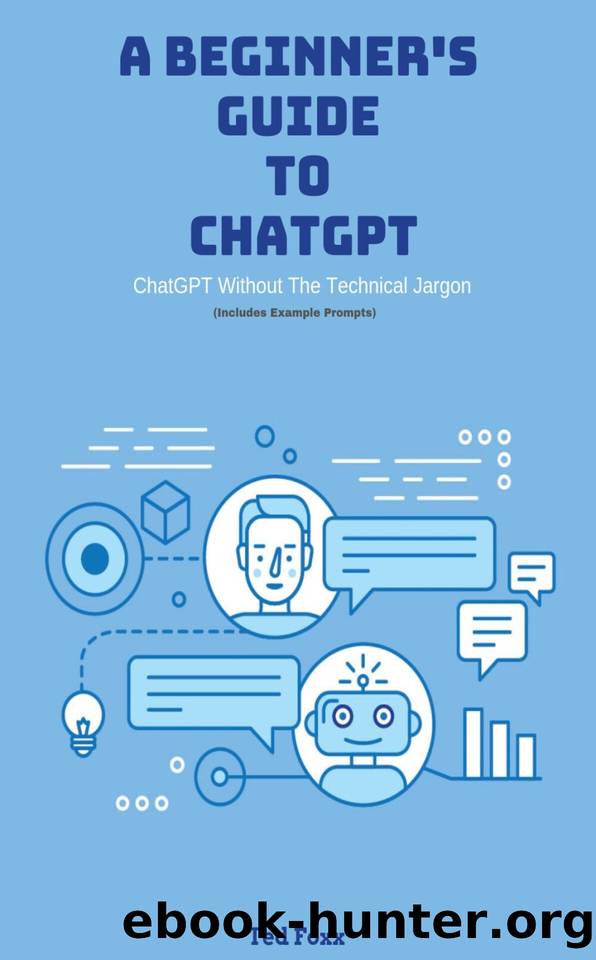A Beginner's Guide To ChatGPT : (without the technical jargon) by Foxx Ted

Author:Foxx, Ted
Language: eng
Format: epub
Publisher: Ted Foxx Books
Published: 2023-11-07T00:00:00+00:00
Chapter 6: Understanding Limitations and Ethical Considerations
Limitations of ChatGPT
While ChatGPT is an impressive conversational AI model, it is important to understand its limitations. As with any technology, there are certain constraints that you should be aware of when using ChatGPT. This subchapter will discuss some of the key limitations of ChatGPT to help you have a realistic understanding of its capabilities.
1. Lack of context: ChatGPT does not possess contextual memory, meaning it cannot maintain a consistent understanding of long conversations. It treats each input as a separate and isolated prompt, which can result in inconsistent responses if the context is not explicitly provided. Users should ensure that they provide sufficient context to receive accurate and relevant responses.
2. Inaccurate or nonsensical responses: ChatGPT can sometimes generate responses that are incorrect, nonsensical, or even offensive. It is important to remember that ChatGPT is trained on vast amounts of internet text, which includes both reliable and unreliable sources. While OpenAI has implemented measures to reduce harmful outputs, it is still possible to encounter inaccurate or inappropriate responses.
3. Overuse of generic phrases: ChatGPT has a tendency to overuse certain generic phrases or respond with excessively verbose replies. This can sometimes lead to repetitive or long-winded answers that may not be concise or directly address the user's query. Users should be prepared for such responses and may need to rephrase their questions to get more specific or concise answers.
4. Sensitivity to input phrasing: ChatGPT's responses can be sensitive to how a question is phrased. Slight changes in wording can lead to different or inconsistent answers. It is recommended to experiment with different phrasings if you encounter unexpected or unsatisfactory responses.
5. Lack of real-world knowledge: ChatGPT's knowledge is derived from pre-training on internet text, which might not always reflect real-world accuracy. It may struggle with providing up-to-date information or answering questions based on recent events. Users should be cautious when relying on ChatGPT for factual information and consider cross-referencing with reliable sources.
6. Ethical concerns: ChatGPT can inadvertently exhibit biased behavior or respond to harmful instructions. OpenAI has made efforts to mitigate bias and address ethical concerns, but it is an ongoing challenge. Users should be aware of the potential for biased or inappropriate outputs and provide feedback to OpenAI to help improve the system.
Understanding these limitations will allow you to use ChatGPT more effectively and manage your expectations. OpenAI is continuously working to address these constraints and improve the capabilities of ChatGPT, but it is essential to approach its usage with a critical mindset and supplement it with human judgment when needed.
Download
This site does not store any files on its server. We only index and link to content provided by other sites. Please contact the content providers to delete copyright contents if any and email us, we'll remove relevant links or contents immediately.
The Mikado Method by Ola Ellnestam Daniel Brolund(23572)
Hello! Python by Anthony Briggs(22707)
Secrets of the JavaScript Ninja by John Resig Bear Bibeault(21526)
Kotlin in Action by Dmitry Jemerov(20570)
Dependency Injection in .NET by Mark Seemann(20491)
The Well-Grounded Java Developer by Benjamin J. Evans Martijn Verburg(20387)
OCA Java SE 8 Programmer I Certification Guide by Mala Gupta(19537)
Algorithms of the Intelligent Web by Haralambos Marmanis;Dmitry Babenko(18334)
Grails in Action by Glen Smith Peter Ledbrook(17458)
Adobe Camera Raw For Digital Photographers Only by Rob Sheppard(16976)
Sass and Compass in Action by Wynn Netherland Nathan Weizenbaum Chris Eppstein Brandon Mathis(14871)
Secrets of the JavaScript Ninja by John Resig & Bear Bibeault(12834)
Test-Driven iOS Development with Swift 4 by Dominik Hauser(11242)
A Developer's Guide to Building Resilient Cloud Applications with Azure by Hamida Rebai Trabelsi(10603)
Jquery UI in Action : Master the concepts Of Jquery UI: A Step By Step Approach by ANMOL GOYAL(10487)
Hit Refresh by Satya Nadella(9137)
The Kubernetes Operator Framework Book by Michael Dame(8544)
Exploring Deepfakes by Bryan Lyon and Matt Tora(8372)
Robo-Advisor with Python by Aki Ranin(8317)
